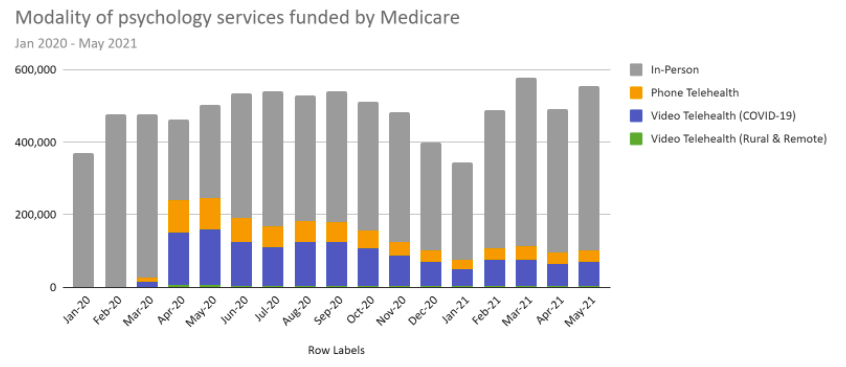The Benefits & Efficacy of Telepsychology
Telepsychology sits within the broader category of telehealth. It refers to the delivery of mental health services through the use of telecommunication techniques to facilitate long-distance client and clinician contact, care, advice, reminders, education, intervention, and monitoring.
Efficacy of Telepsychology
Due to limited funding, telepsychology was not commonly used to deliver mental health services until the COVID-19 pandemic. In April 2020, the lockdown & new Medicare item numbers drove psychology services online, transforming the way mental health care is delivered.

Graph showing the number of Medicare-funded psychology services (including Clinical Psychology), since the beginning of 2020.
Currently, there are a number of Australian studies available that have looked into the efficacy of delivering mental health treatments with telepsychology.
A University of Queensland study (Snowswell et al. 2019) showed that “that telehealth is often equally as effective, if not more, than usual care”.
Similarly, Swinburne University published a systematic review of studies (Thomas et al. 2021) in which video telehealth was used to deliver psychological therapies to adults with mental disorders. The studies showed “therapy was found feasible to deliver via videoconferencing, clients were satisfied with therapy, and expected improvements in targeted symptoms occurred”.
Benefits of Telepsychology for Clinics and Clinicians
1. Provides insights into clients' social determinants of health
Telepsychology sessions can provide clinicians a great deal of information about clients' surrounding environment which can lead to breakthroughs in treatment.
2. Helps reduce waitlists and no-shows
When there is a cancellation of an appointment, contacting the next person on the waiting list can help fill up canceled spots quickly. Similarly, clients can be connected with available clinicians who may not be in the same physical location as the client seeking therapy, enabling access to therapy sooner than in person.
3. Protects healthcare providers from exposure to illnesses
Telepsychology can help protect vulnerable healthcare workers from infectious diseases, such as COVID-19.
4. Improves multidisciplinary care
Telepsychology provides an important advantage in the provision of MDT (multidisciplinary team) meetings, compared with traditional settings. This can lead to improved provisions of diagnosis, treatment, and follow-up to clients irrespective of location.
5. Improves continuity of care
Telepsychology offers greater continuity of care to clients, as they can continue relationships with their therapists even if they have moved locations.
6. Creates greater flexibility and work-life balance
Clinicians can have a more flexible schedule due to the ability to work from home.
7. Expanding footprint
Telepsychology can enable mental health professionals to extend their clinical footprint and reach new areas.
Benefits of Telepsychology for Clients
.jpg?width=1000&name=Untitled%20design%20(8).jpg)
1. Makes healthcare services more convenient and accessible
Clients can seek telepsychology services from the comfort of their own homes. Taking time off work/school, travel, and waiting in the waiting room are no longer barriers to accessing care. The productivity commission estimates patients spend 50 million excess hours in waiting rooms, costing patients $900 million a year.
2. Bridges health inequities
Telepsychology can improve access to care for those located in rural and regional areas, where access to mental health professionals is limited. Similarly, telepsychology services are a lot more accessible for people with disabilities and elderly Australians, who may require hiring a support person as well as arrange transportation to attend in-person therapy.
Aboriginal and Torres Strait Islanders and other culturally and linguistically diverse clients can seek out an appropriate provider for them, and those that require interpreters can access them on-demand with a click of a button.
3. Improves health outcomes
Telepsychology can lead to better health outcomes according to studies. The ability to easily connect with a mental health professional online means clients can receive early intervention, ensuring timely care. In addition, multiple Coviu users reported that teletherapy can lead to breakthroughs in treatment for certain clients who respond better to online treatment than in-person.
4. Protects vulnerable members of society
Telepsychology has a major role to play in further preventing the spread of COVID-19. This is particularly important for clients who may be vulnerable members of society who may need to be self-isolating.
Haven't tried telepsychology yet? What are you waiting for? Get started for FREE now.



-1.jpg?width=680&height=451&name=DAAS%20(1)-1.jpg)


.png)